1
2
3
4
5
6
7
8
9
10
11
12
13
14
15
16
17
18
19
20
21
22
23
24
25
DTE 82

Original releasedate: 1 April 1981

Original releasedate: 1 April 1981
This is a rough'n'ready translation of the magazine which was original in the Dutch language.
Besides this is only a summary as only the most interesting parts are translated.
Besides this is only a summary as only the most interesting parts are translated.
| From the Headoffice |
|
Hello everyone, Because of the good news of Rainbow touring in Holland we needed more space so this section is cancelled. If we see the sale figures of "Difficult to cure" we assume that there must live at least ten thousand Rainbow-fans in Nederland. the fanclub management CONCERT AGENDA TOURING IN HOLLAND (AT LAST) RAINBOW Short after the release of "Difficult to cure" Rainbow took off to the States. After a few try-outs in small clubs they started touring overthere. In June they'll start doing an European tour. The start will be in Finland and they'll do a concert around 20 June overhere. Place and exact date are not yet known. WATCH OUT STOP PRESS ! 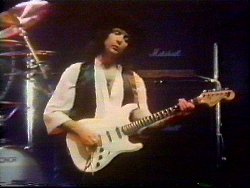 On Saturday 13 June promoter Wim Bosman will arrange an one-off concert of RAINBOW in AHOY in Rotterdam!!!!!! SOUNDS POLL 1980 For the third time in a row we have poll-results. This time from the English SOUNDS magazine! |
|
BAND: 1. Motorhead 2. AC/DC 3. Rush 6. RAINBOW 7. Whitesnake ALBUM: 1. Ace Of Spades - Motorhead 2. Back in Black - AC/DC 3. Permanent Waves - Rush 5. Heaven And Hell - Black Sabbath 7. Michael Schenker Group - M.S.G. SINGLE: 1. Ace Of Spades - Motorhead 2. 747 Strangers In The Night - Saxon BASSPLAYER: 5. ROGER GLOVER DRUMMER: 1. Neil Peart (Rush) 2. COZY POWELL 5. Ian Paice |
KEYBOARDSPLAYER: 1. Jon Lord 2. DON AIREY 6. Colin Towns GUITARPLAYER: 1. RITCHIE BLACKMORE 2. Michael Schenker SINGER: 1. Peter Gabriel 2. David Coverdale 3. Ian Gillan 4. David Coverdale 5. RONNIE JAMES DIO MALE SEXOBJECT: 1. David Coverdale 2. Ian Gillan MOST BORING: 1. The Police 5. Rumours on a Deep Purple reunion MOST PROMISING: 1. Michael Schenker Group |
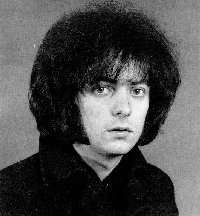 PIC FROM 1968 There are many request for printing an old photo of Ritchie Blackmore. This one is from the early Deep Purple days. Ritchie started his Purple adventure when he wasn't 23 years old. In April he'll have his 36th birthday. We send him a birthday card from all Fanclan-members to his private address. RITCHIE, CONGRATULATIONS FROM HOLLAND!!! RECORD TALK
Seven surgeons are lookin' at the patient on the cover of the sixth Rainbow-LP. On the backcover the spectator gets the illusion that he's on the operating table, while some doctors bend worried over the patient. Is the patient (the fan) ill? Is he really "difficult to cure"? How will he react on the new Rainbow album, is that the operation the fan has to undergo? The result of the surgery will get clear after he has listened this record. The fan determines himself the result of the operation whether it successful or not.RAINBOW FAR(THER)-REACHING REJUVENATION DIFFICULT TO CURE POLYDOR 2391 506 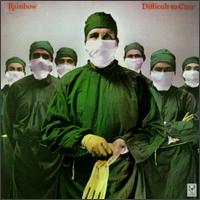 It's a possible interpretation of this cover, one that's according to Rainbow-concept a bit rare. There's no rainbow this time. I asked the manufacturers of the cover, Hipgnosis (known from Pink Floyd and also the album of Michael Schenker for example), what order they got of Blackmore for this album, but they didn't want to tell anything ("We are not allowed to get these kind of things in publicity."). The answer has to come out of the mouth of Ritchie himself.
It's a possible interpretation of this cover, one that's according to Rainbow-concept a bit rare. There's no rainbow this time. I asked the manufacturers of the cover, Hipgnosis (known from Pink Floyd and also the album of Michael Schenker for example), what order they got of Blackmore for this album, but they didn't want to tell anything ("We are not allowed to get these kind of things in publicity."). The answer has to come out of the mouth of Ritchie himself.Original this release was planned for last November, but the delay will have a lot to do with the arrival of the third singer in the band. Official it was release on 6 February in Holland. After playing this record the first time it became obvious that Blackmore surprised us again, still not in a positive way. No matter how you look at it, this album is different than expected. "D.T.C." is an album full of surprises. At first I didn't like this album that much but after playing it a couple of times again it was clear this is an album that has to grow. Never before there was such a large diversity of compositions on a Rainbow album. Many elements from the past pops up, but we get some new dimensions as well. Some we recognized on "Down to earth" already and they arise out of the crystal clear producing of Glover. The past comes back in "Spotlight Kid", that sound like a continuation of "A Light In The Black". Rondinelli sounds great, just like Cozy is still behind the drumkit, Ritchie conjures together with Airey a typical Blackmore-riff, like we know it from the past in songs like "Burn", "Highway Star", "A Light In The B1ack", Ki11 The King, and longer ago "Wring That Neck" and "Mandrake Root". On the whole line all the songs are kept compact, which maintain the tension. there are no long solos."Can't Happen Here" looks like a copy of "All Night Long" but actually is a better version of that song. "No Release" has a surprising structure. This time not the usual verse-chorus-verse-chorus-solo-verse-chorus-line. At first I thought the a-capella-part was annoying, but it appear to be a pause for the storm to come. "I Surrender", again written by Russ Ballard, is a lot more acceptable than "Since you been gone". The smooth guitarline makes this song really run afloat. "Midtown Tunnel Vision" is compositional a logic follow-up for "Love's No Friend" and "Mistreated". "Vielleicht das nachster Zeit" (Hey, Ritchie, muss das nicht 'das nächste Mal' sein?) is then a logic follow-up for "Weiss Heim", the English b-side of "All Night Long", but is not as good as that song. The titletrack, the treatment of the choir in the end of Beethoven's Ninth Symphony, is already part of the liveshow since 1976 (first in "Still I'm Sad", last year in "Lost In Hollywood"). Now we get the studio version on this record. This recording goes a lot further than the live-versions I heard. "Freedom Fighter" is not a too strong composition. It gets a bit boring because the chorus is repeated too much. And then we have one more left: Moran's "Magic", this is the nadir, a real failure. It's a mystery what this song is doing on a Rainbow-album. Blackmore admits here too much to the American commercial demands. So far the compositional part of the album. 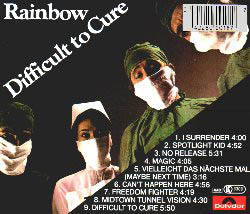 Blackmore surprises everyone with this record which sounds very tight. This record has a large diversity in sound and tempo. Never before we heard so many styles on a Rainbow-album. Every song is different and that's the strength of this album. Than the musicians. Don Airey does have a more noticeable part in the Rainbow-sound. In the past we hardly noticed the keyboards. On "D.T.C." they are noticed, bright tones including a TOTO-like piano-roll in "Vielleicht..." and the melodic line in "Magic" gets a keyboards underground as well. Don Airey's best part is in the titletrack, the synthesizer takes a large part from the bassguitar away and Don's solo reminds me to the good old times.
Blackmore surprises everyone with this record which sounds very tight. This record has a large diversity in sound and tempo. Never before we heard so many styles on a Rainbow-album. Every song is different and that's the strength of this album. Than the musicians. Don Airey does have a more noticeable part in the Rainbow-sound. In the past we hardly noticed the keyboards. On "D.T.C." they are noticed, bright tones including a TOTO-like piano-roll in "Vielleicht..." and the melodic line in "Magic" gets a keyboards underground as well. Don Airey's best part is in the titletrack, the synthesizer takes a large part from the bassguitar away and Don's solo reminds me to the good old times.The part of Roger Glover is often criticized. As bassplayer he doesn't have a striking role. His role in Rainbow is more to be an arranger and producer. And he does a great job on that field. Than the new people: Bob Rondinelli was for me a total stranger, but he pleasantly surprised me. He doesn't have a sound that is as heavy and powerfull as Cozy Powell, but technically he's of the same level as Cozy. He give us some great breaks. Ritchie has found a great drummer in Bob. I'm most bothered with Joe Lynn Turner. On the last album I was surprised enormously about the power and voice control of Bonnet. Joe Lynn sings totally different, more in the bluesy/soul direction, like Coverdale does. You can recognize the style by the many cries and shouts you hearing the middle of a solo. I'm not too fond of that, it's just like with Coverdale. Still I'm be convinced of Turner, mainly because of his dedication. On the technical front he doesn't catch the talent of Bonnet and Dio, not yet this time. But he can stay.  That leaves us with the nearly (on 14 April) 36-years old Blackmore. Especially in the English press he got criticized that he do not bring anything new. On this album Ritchie gives us a complete new sound, listen to the solo in "Freedom Fighter" for example.
That leaves us with the nearly (on 14 April) 36-years old Blackmore. Especially in the English press he got criticized that he do not bring anything new. On this album Ritchie gives us a complete new sound, listen to the solo in "Freedom Fighter" for example.Also compositional he's making progress. "No Release" is something totally different than we expect from him. And still we get a familiar sound. In England also Roger's lyrics got criticized. They were too negative for women. On this album Roger shows he can also write about other subjects. Ritchie has restored to youth. Rainbow sounds fresh and new again. It sounds like a new group and in a certain way it is. Ritchie wants to broaden his audience. Still some reflections. On the end of "D.T.C." we hear Oliver Hardy laughing. Knowing Blackmore this will have a meaning. Is he making a fool out of the once cheered classics? Or does this reflects on the whole album? Should we take this album serious? I think it the first suggestion, although I don't know why he's giving Beethoven a kick. The whole album breaths like it's forced to get commercial success, so Ritchie, are you the spotlight kid? Ritchie already announced an instrumental album with romantic music. The title "Vielleicht das nachster Zeit" could be a clue. My final conclusion is that this sixth Rainbow-album is the most diversity ever. A complete record, possible the LAST Rainbow album ever? Time will tell. Gerrit GRAHAM IS BACK 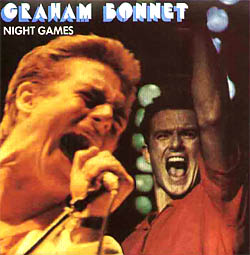 GRAHAM IS GONE! You could read that in the last issue, but faster than expected Graham Bonnet is back with a solo-product.
GRAHAM IS GONE! You could read that in the last issue, but faster than expected Graham Bonnet is back with a solo-product.Firstly Phonogram released the single "NIGHT GAMES" with on the b-side "OUT ON THE WATER" on Vertigo 6000 637. An album is expected soon with a fine title "DANGEROUS LINE-UP". And dangerous it is indeed, nobody else than Cozy Powell, Mick Moody, Neil Murray and Quo-pianoplayer Andy Bown are trapped into Graham's recording studio. The record will be produced by Francis Rossi and John Eden. Graham still haven't got writing ambitions. "Night games" is a Hamilton song, that sounds solid, and has a singable chorus. "Out on the water" is a song by Micky Moody and Quo-roadie/mouth organplayer Bob Young (they once did an album). Bonnet sings loud as we know him. The album looks very promising. WHITESNAKE 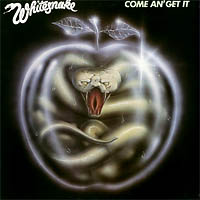 Just before or after this issue comes out WHITESNAKE will release a new album on 6 April. The title is "COME AND GET IT". The tracks will be:
Just before or after this issue comes out WHITESNAKE will release a new album on 6 April. The title is "COME AND GET IT". The tracks will be:side 1: "Come and get it", "Hot stuff", "Don't break my heart again", "Lonely days, lonely nights", "Wine, women and song". side 2: "Child of Babylon", "Would I lie to you", "Girl", "Hit and run", "Till the day I die". The new single is "Don't break my heart again". In the next RECORD TALK we'll have a review. GILLAN  GILLAN released the single "M.A.D."/"The Maelstrom" (Virgin VSK 103). The a-side has an anti-nuclear war-song, fully called "Mutually Assured Destruction". Both songs won't be released on the next album. March 14th GILLAN also released another single "NEW ORLEANS", it's the fourth time this song hits the English charts. According to the Guiness Book of British Hit Singles 1952-1977 by Jo and Tim Rice before U.S. Bonds (1961), Bern Elliott (1964) and Harley Quinne (1972) had a hit with the same track. On the b-side we get "Take a hold of yourself". This track won't be on the new GILLAN LP, due to released late April/early May.  The title of the album will be "Future Shock" and the tracks are:
The title of the album will be "Future Shock" and the tracks are:side 1: "Future Shock", "Nightride out of the Phoenix" "Ballad of the Lucitania Express", "No laughing in heaven", "Sacre blue", "New Orleans". side 2: "Bite the bullit", "If I sing softly", "Don't want the truth", "For your dreams". Next time a review in RECORD TALK. EPISODE SIX A FORGOTTEN CHAPTER GLOVER AND GILLAN IN THE SIXTIES In the past we had a article on the past of Ritchie Blackmore, the period 1962-1964, when he played guitar in the Outlaws. This time we take a look at the activities of both Roger Glover and Ian Gillan, before they joined Deep Purple in 1969. Central in this story is the group EPISODE SIX. THE START Roger Glover was born on 30 November 1945 in the village Brecon in Wales. He went to Harrow County School, there were two groups in which students played; The Lightnings and The Madisons. In that last one Roger played the bass. Other names in that band were Tony Lander (lead-guitar) and Harvey Shields (drums). When both groups lost a few members, they got combined and because The Lightnings were slightly more popular, they took that name. They played on weddings, in youthclubs and on parties. They were huge fans of Shane Fenton & The Fentones. On the moment Roger went to study on Hornsey Artschool they changed their name in EPISODE SIX. THE BEGINNING (1963) 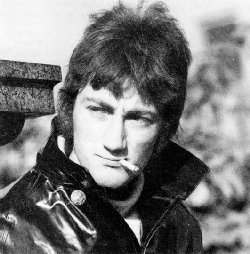 That was October 1963. Along Roger, Tony and Harvey there were Graham (guitar/vocals) and Sheila Carter Dimmock (keys/vocals) and singer Andy Ross. This line-up continued till May 1965. Then Ross left the band because he got married and has to find himself a job. He was replaced by IAN GILLAN.
That was October 1963. Along Roger, Tony and Harvey there were Graham (guitar/vocals) and Sheila Carter Dimmock (keys/vocals) and singer Andy Ross. This line-up continued till May 1965. Then Ross left the band because he got married and has to find himself a job. He was replaced by IAN GILLAN.Ian was born on 19 August 1945 in Hounslow, Middlesex. His first group was The Moonshiners, they existed four months (September till December 1962). Then he joined the semi-professional The Javelins. They played often the hall of the Richmond Station Hotel, where also the Rolling Stones often played. The repertoire of The Javelins was mainly Rhythm & Blues. In January 1964 the group splitted up and Ian formed the jazz-bluesgroup The Hickies to finish his om nog contractual commitments. After that he sang with The Wainwright's Gentlemen. They were also from Harrow. He got invited to join Episode Six and was replaced in The Gentlemen by Brian Connolly, who later became the singer of The Sweet. FIRST SUCCESS Roger told: "We got professionals in April 1965, when we left for Germany. It was our 'breakthru' - a whole month playing in the clubs. It was a tough job. I then already had some problems with my health, and I got ill and was taken to hospital. I was semi-professional, while the other were fulltime pros which only mean they had no other job. When we left for Germany we just got ourselves a new manager, Helmut Gordon, who also was the manager of The Who. He arrange a recorddeal with Pye Records: ¾ percent was our share and that for the six of us. When he disappeared, Gloria Bristow took over and with her we worked till the end of the group." Episode Six was known for the melodic many-voiced ballad. If they should have scored one real hit, they could have become real big. Roger: "Ian joined us and we started to record singles. We had quite some work in Germany and we were two months in the Lebanon, but that was horrible. We had to play backgroundmusic while the gambling machines and one armed bandits were making a lot of noise. It almost killed the band, but in the end we made enough money to buy a Ford Transit-van. I'll never forget, when we came home, HENDRIX HAD HAPPENED. We were known on Radio London, we also did quite some live-shows for them and some of our records were even in their charts." THE RECORDS In the period May '65 - September '67 the group recorded five singles: 1. Put yourself in my place/That's all I want (Pye 7N 17018 - January '66) 2. I hear trumpets blow/True love is funny (Pye 7N 17110 - April '66) 3. Here, there and everywhere/Mighty Morris 10 (Pye 7N 17147 - August '66) 4. Love-hate-revenge/Baby baby baby (Pye 7N 17244 - February '67) 5. Morning dew/Sunshine girl (Pye 7N 17330 - June '67) Ian Gillan: "When we returned from Beirut, we had three singles in the Radio London top ten. Their charts were put together by a couple of recordstores. The singles didn't sell a lot, but it gave us a famous feeling anyway." Drummer Shields met in Beirut a Greek belly dancer. He decided, when the band returned to England, to stay with her and left the group. 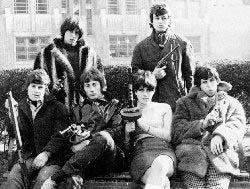 His replacement was John Kerrison. Till then the singles hits were album tracks by other, like "Here, there and everywhere" was a track from Beatles LP "Revolver". But Roger Glover start to develop himself as a songwriter. He wrote the b-side for that single, a song that sounds like the Jan & Dean surfsound. "I can see you through" was his first a-side. He also started to work together on it with Ian. When the more heavy rock got popular, the group still played the same repertoire, they only turned up the volume. The line-up with John Kerrison did two singles:
His replacement was John Kerrison. Till then the singles hits were album tracks by other, like "Here, there and everywhere" was a track from Beatles LP "Revolver". But Roger Glover start to develop himself as a songwriter. He wrote the b-side for that single, a song that sounds like the Jan & Dean surfsound. "I can see you through" was his first a-side. He also started to work together on it with Ian. When the more heavy rock got popular, the group still played the same repertoire, they only turned up the volume. The line-up with John Kerrison did two singles:1. I can see you through/When I fall in love (Pye 7N 17376 - October '67) 2. Little one/Wide smiles (MGM 1409 - May '68) That last single was released under the name of The Episode. Kerrison disappeared in a strange way. After a row in the dressingroom he put his drumkit in the back of the hall, and did play there his last show, that was July '68. His successor was Mick Underwood. Yes, the Mick Underwood, who played with Ritchie Blackmore in The Outlaws (1963) and now again plays in Gillan!! The group changed from recordlabel and went to the Chapter One-label, owned by orchestra leader Les Reed. The group did here there last two singles. THE END CAUSED BY PURPLE ! Those last two singles are: 1. Lucky Sunday/Mr. Universe (Chapter One CH 103 - October '68) 2. Mozart versus the rest/Jak d'Or (Chapter One CH 104 - February '69) Mick Underwood still was in contact with Ritchie. Blackmore told him he didn't like the singer of Purple (Rod Evans) no longer and was lookin' for somebody else. Mick invited Ritchie and Jon to check out Ian Gillan. Both were impressed by Ian and they offered him the job. 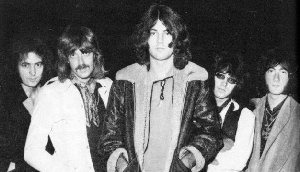 Gillan accepted and asked if Roger also could join since they were a writing couple. It was no problem. The leaving of Ian and Roger was the end for Episode Six. They continued as an instrumental group till July '69.
Gillan accepted and asked if Roger also could join since they were a writing couple. It was no problem. The leaving of Ian and Roger was the end for Episode Six. They continued as an instrumental group till July '69.Roger was replaced by Tony Dangerfield who was suggested by Ritchie who played together with Tony in 1967. A never confirmed story says that Ritchie offered to play leadguitar on the last single as a compensation for pinching away Roger and Ian. The instrumental "Mozart versus the rest" has fierce guitarplaying. This could be Blackmore. But there's no-one who can confirm this. I still think it's Ritchie Blackmore who plays the guitar on this single. July '69 it was definitive over for Episode Six. Gerrit 5 FANS INTERVIEW RITCHIE
part 2 "I tend not to do many interviews, as you know," Ritchie Blackmore said. "But one thing I'd really like to do is one with some fans. I think that would be very interesting ..."
© Rainbow Fanclan 1979-1984
|